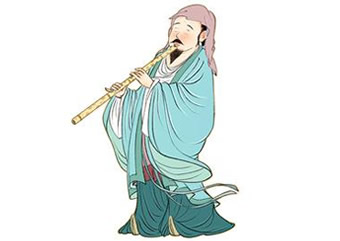Propriety and Music in Confucianism
Confucius's ideas about music apparently had a conservative and retrospective color.He insisted on "being happy but not lascivious,and being sentimental but not mawkish."Music should be used to express moderate and social feeling of humans rather than excessive and animal-like emotions.He said music should be a sound of peace and harmony,and advocated "siwuxie" (thoughts free of evil intention,and "wuxie"meaning rites),with regard to music content.That was to say,music should be in accordance with rites and not violating social etiquette,and should be a highly harmonious integration of beauty and kindness.
From the perspective of good human nature,Mencius considered music was a natural way in which people expressed their thirst for happiness.Loving beautiful music is human nature.Meanwhile,Mencius also noticed the educational role of music,pointing out that moral music was more touching than moral speeches.In Mencius's eyes,"sharing happiness with people"was the key in ancient times and modern days.This coincided with his people-based thought with the core belief that "the people were the most important element in a state;next were the gods of land and grain;least was the ruler himself."Ideas about music held by Confucius and Mencius were just isolated words and unsystematic.On such a basis,however,Confucians of later generations developed a relatively complete music ideological system.
Yuelun(On Music)written by Xunzi and The Book of Music that was finished in the Western Han Dynasty(206BC-25AD) summarized and developed early Confucian music ideas.The Book of Music held that music was something subjective affected by objective matters,and"only music couldn't be disguised,that music is the revelation of one's true feelings."ShangshuYaodian,a piece of classic work in the pre-Qin period,said music"was a link to the gods and ghosts and could inspire the dances of all beast."
Xuzi .Yuelun said “Music could deeply touch the hearts of "Xunzi continued people and play its educational role quickly many ideas of contucius and further developed them into the music theory of Fajia (the legalist school). He believed that peoplk needed music and this was inevitable. But to stave off immorality and chaos,"The Ya and Song must be formulated to guide tha development of music,"and "efforts should be made to touch the good side of human nature and thus keep music from the evi spirits."Xunzi opposed "obscene music,""evil music"and "the music of Zheng and Wei Kingdoms,"which actually referred to folk music. He said music "could educate people and deeply move them,"and"transform outmoded habits and customs."
The social function of music was thus elevated to a position of political education.
In a word, the pre-Qin Confucians considered "rites should be used to control people's behaviors, and music used to unify people's voices."Ritual music should be available to people to improve themselves. The Confucian concept of "cultivating oneself and putting family in order, governing one's nation and stabilizing the world"-involving every aspect from self-cultivating, social harmony to political civilization and world peace-that ran through the ritual music ideas, reflected the Confucians' recognition of music having a social in an all-round way.



